Related Research Articles

A psychic is a person who claims to use powers rooted in parapsychology such as extrasensory perception (ESP) to identify information hidden from the normal senses, particularly involving telepathy or clairvoyance, or who performs acts that are apparently inexplicable by natural laws, such as psychokinesis or teleportation. Although many people believe in psychic abilities, the scientific consensus is that there is no proof of the existence of such powers, and describes the practice as pseudoscience. The word "psychic" is also used as an adjective to describe such abilities.
The Stargate Project was a secret U.S. Army unit established in 1978 at Fort Meade, Maryland, by the Defense Intelligence Agency (DIA) and SRI International to investigate the potential for psychic phenomena in military and domestic intelligence applications. The project, and its precursors and sister projects, originally went by various code names – 'Gondola Wish', 'Stargate', 'Grill Flame', 'Center Lane', 'Project CF', 'Sun Streak', 'Scanate' – until 1991 when they were consolidated and rechristened as the "Stargate Project".
In American science fiction of the 1950s and 1960s, psionics was a proposed discipline that applied principles of engineering to the study of paranormal or psychic phenomena, such as extrasensory perception, telepathy and psychokinesis. The term is a blend word of psi and the -onics from electronics. The word "psionics" began as, and always remained, a term of art within the science fiction community and—despite the promotional efforts of editor John W. Campbell, Jr.—it never achieved general currency, even among academic parapsychologists. In the years after the term was coined in 1951, it became increasingly evident that no scientific evidence supports the existence of "psionic" abilities.
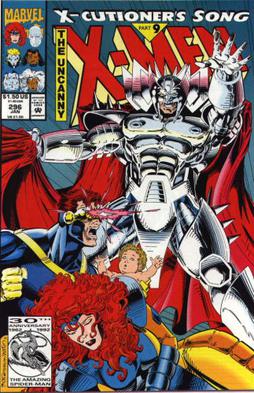
Stryfe is a supervillain appearing in American comic books published by Marvel Comics, most commonly in conflict with the superhero team X-Force. He is a clone of Cable from Cable's alternate future timeline.

Franklin Benjamin Richards is a fictional character appearing in American comic books published by Marvel Comics. The character is usually depicted as a supporting character in Fantastic Four. He has been portrayed as a child and as a novice superhero.

Cable is a fictional character appearing in American comic books published by Marvel Comics, commonly in association with X-Force and the X-Men. The child Nathan first appeared as a newborn infant in The Uncanny X-Men #201 created by writer Chris Claremont and penciler Rick Leonardi, while the adult warrior Cable was created by writer Louise Simonson and artist/co-writer Rob Liefeld, and first appeared in The New Mutants #87. Initially, Cable's origin was undecided and he was assumed to be a separate character. It was later decided that he was actually an older version of the child Nathan, having later become a time traveler.

The Shadow King is a supervillain appearing in American comic books published by Marvel Comics. The character is particularly associated with the X-Men family of comics. His nemesis is the X-Men's leader, Professor X, while he also figures into the backstory of the X-Man Storm. As originally introduced, Farouk was a human mutant from Egypt who used his vast telepathic abilities for evil, taking the alias Shadow King. Later writers established Farouk as only the modern incarnation of an ancient evil entity that has been around since the dawn of humanity, who became one with Farouk when he grew older.
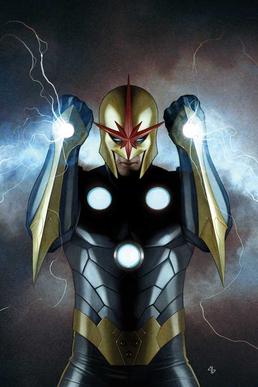
Nova is a character appearing in American comic books published by Marvel Comics. The character appeared historically as the star of his own series, and at other times, as a supporting character in team books such as The New Warriors. He is a member of the intergalactic police force known as the Nova Corps. He has access to the Nova Force and superhuman abilities including enhanced strength, flight and resistance to injury.

Frederick Robert Williamson, also known as "the Hammer", is an American actor and former professional football defensive back who played mainly in the American Football League (AFL) during the 1960s. Williamson has had a busy film career, starring as Tommy Gibbs in the 1973 crime drama film Black Caesar and its sequel Hell Up in Harlem. Williamson also had roles in other 1970s blaxploitation films such as Hammer (1972), That Man Bolt (1973) and Three the Hard Way (1974).
Steve Perry is an American television writer and science fiction author.

Power Pack is a superhero team consisting of four young siblings appearing in American comic books published by Marvel Comics. Created by writer Louise Simonson and artist June Brigman, they first appeared in their own series in 1984, which lasted 62 issues, and have since appeared in other books. Power Pack is the first team of pre-teen superheroes in the Marvel Universe and the first team of heroes in comics to feature characters of that age operating without adult supervision. In 2005, the title was relaunched as a series aimed at younger readers—though this was eventually declared a separate continuity from that of the original series and the mainstream Marvel Universe.
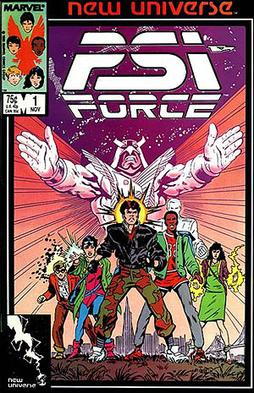
Psi-Force is a comic book series created by Archie Goodwin and Walt Simonson and published by Marvel Comics under their New Universe imprint from 1986 to 1989. It ran for 32 issues and an annual.
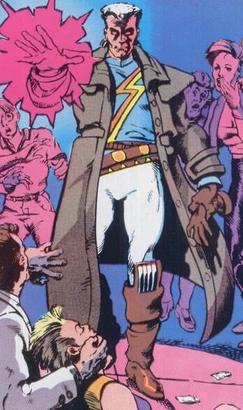
Justice is a fictional character appearing in American comic books published by Marvel Comics. The character appeared in the New Universe imprint of Marvel Comics, primarily as the protagonist of a 32-issue comic book series of the same name published from 1986 to 1989. Most of its run was written by Peter David and penciled by Lee Weeks, though it also featured rare 1980s Marvel work from Keith Giffen. David later reintroduced Justice as a supporting character in Spider-Man 2099, a series with a very different setting. This version of the character, also known as the Net Prophet, was older and had different powers.

Aron Tager was an American actor, poet, artist and sculptor, he is best known for voicing Cranky Kong in the animated television series, Donkey Kong Country.
Discrimination against superheroes is a common theme and plot element in comic books and superhero fiction, usually as a way to explore the issue of superheroes operating in society or as commentary on other social concerns. Often in response to this are Registration Acts, fictional legislative bills that have been plot points used in various comic books and mediums which, when passed into law, enforce the regulation of extra-legal vigilante activity vs. criminal activity, or the mandatory registration of superpowered individuals with the government.
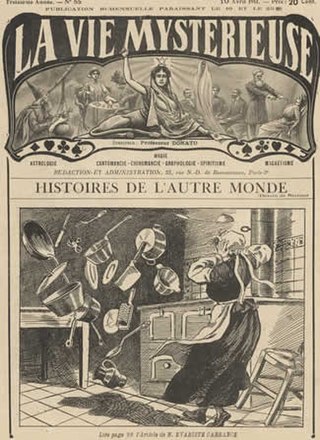
Telekinesis is a hypothetical psychic ability allowing an individual to influence a physical system without physical interaction. Experiments to prove the existence of telekinesis have historically been criticized for lack of proper controls and repeatability. There is no reliable evidence that telekinesis is a real phenomenon, and the topic is generally regarded as pseudoscience.
References
- ↑ "Peter David's Psi-Man | LibraryThing".
- ↑ David, Peter (2000). Mind-Force Warrior. Penguin Publishing. ISBN 0441007058.